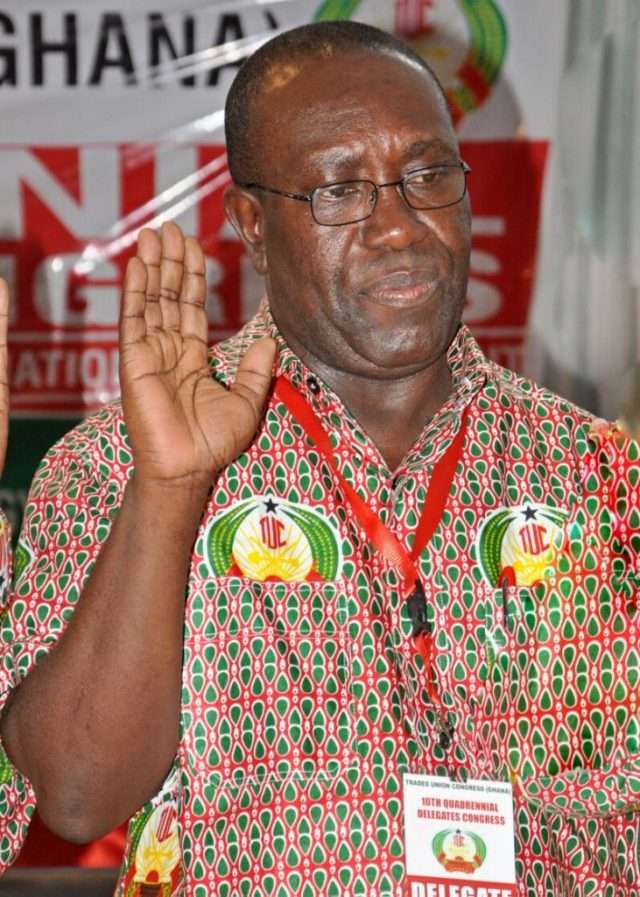The Trades Union Congress (TUC) on Thursday relaunched a Workers’ Manifesto to outline its vision for the country at the union’s General Council Meeting at Kasoa in the Central Region.
The 48-page booklet spells out the position, views and suggestions of the TUC on some major policy areas, including social and human development, economic, labour market, energy, climate change and environment, as well as governance.
The manifesto is a tool for the engagement of the TUC with managers of the economy, civil society organisations (CSOs) and political parties, particularly the governing New Patriotic Party (NPP) and the dominant opposition National Democratic Congress (NDC).
The Director of Labour, Research and Policy Institute of the TUC, Dr Kwabena Nyarko Otoo, giving an overview, said the manifesto, among other things, was crafted on the belief that the nation could feed its population, but that this could be achieved by subsidising farmers through the provision of inputs and extension services.
“If imports of food items are limited and Ghanaian farmers are guaranteed market for their produce, Ghana will achieve food security within a short period of time,” the aspect of the document on social and human development recommended.
On access to education under human development, the manifesto called for more efforts to ensure that all children of school age were in school, stressing that “we must improve access to higher level of education to enhance the fourth industrial revolution”.
The document emphasised prioritisation and implementation of social housing programmes on a mass scale, and to improve sanitation conditions for the poor and vulnerable in society.
Economy, unemployment
On economic policy, the manifesto states that the current macroeconomic policy framework “is a relic of the Structural Adjustment Programme”.
It identified employment as missing from the framework because it was assumed without any evidence whatsoever that growth and macroeconomic stability automatically led to the creation of employment.
“The framework must change because we believe that it is the source of the unemployment challenge in Ghana,” it added.
It stressed the need to ensure proper management of the nation’s natural resources.
On energy, the TUC advocated the need for government not to allow what it described as “strategic national assets” such as the Tema Oil Refinery (TOR) and the Electricity Company of Ghana (ECG) to be handed over to foreign commercial interests.
“We are fully aware of the challenges TOR and ECG are facing. But we also know that most of these challenges have been inflicted on the companies by various government policies.
“The solution, therefore, does not lie in handing over the companies to foreign interests; government should work with all stakeholders to fix the problems,” the manifesto further recommended
Too much powers
On governance issues, the Workers’ Manifesto supported calls for a review and change of the 1992 Constitution.
It stated that the nation needed a Constitution that “truly gives power to the people” and guaranteed democracy that gave assurance of the basic necessities of life.
It, therefore, suggested some key issues that guided the TUC’s campaign for constitutional reforms.
These, it said, included how to reduce the powers of the President and give power back to the people.
Other key areas the manifesto suggested for review were true separation of powers among the Executive, Legislature and Judiciary, as well as whether or not partisan politics was appropriate for the nation.
It also raised issues regarding the role of the Electoral Commission and the need to perform its mandate fairly and objectively for consideration in the constitutional reform proposals.
Home-grown solution
The Secretary General of the TUC, Dr Anthony Yaw Baah, relaunched the manifesto, and said the overall goal of the exercise was to ensure that Ghana adopted home-grown solutions to address its socio-economic challenges because the TUC had observed that “the neo-liberal approach to economic management is no longer appropriate for the nation”.
The TUC General Council meeting is the highest decision-making body after its Congress, and it was attended by organised labour from the 16 regions.









































